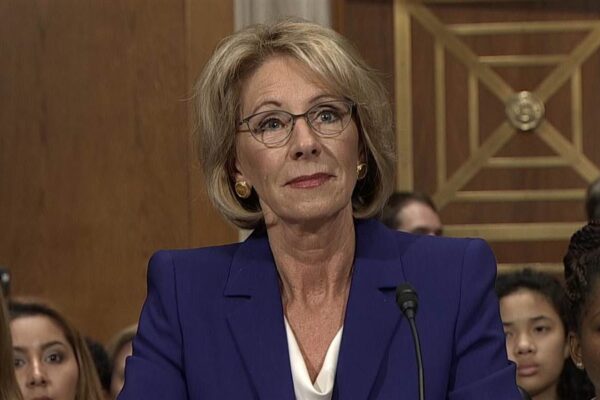U.S. Education Secretary Betsy DeVos greeted the release of President Donald Trump’s preliminary fiscal year 2018 budget with praise for its education initiatives. “A Blueprint to Make America Great Again” would cut more than $9 billion from federal education spending but invest significantly in school choice. FutureEd Director Thomas Toch dissects her remarks and how they square with the policies the budget endorses.
Today’s Budget Blueprint keeps with President Trump’s promise to focus the U.S. Department of Education on its mission to serve students.
The budget places power in the hands of parents and families to choose schools that are best for their children by investing an additional $1.4 billion in school choice programs.
The administration’s proposed $250 million program to subsidize private school tuition would help families cover the cost of private education. But in the private education sector, schools have the power to admit or reject applicants. Voucher programs are indeed “school choice” initiatives.
It continues support for the nation’s most vulnerable populations, such as students with disabilities, while streamlining and simplifying funding for college and continuing to help make college education more affordable.
Not exactly. The administration is proposing to cut federal funded programs that ready low-income students for college, reverse a planned $3.9 billion increase in Pell Grants for such students, and eliminate all together the Federal Supplemental Educational Opportunity Grants program, another federal financial aid program targeted at economically disadvantaged students.
Taxpayers deserve to know their dollars are being spent efficiently and effectively.
Yes, they do. And the administration is right to stress the importance of evidence that programs accomplish intended goals. But that commitment does not square with Secretary DeVos’ refusal to require private schools receiving public monies to supply information about their performance to parents and taxpayers.
During her confirmation hearing, Virginia Sen. Tim Kaine (D) asked her if she agreed that “all schools that receive taxpayer funding should be equally accountable.” “Well no…,” DeVos replied.
This budget is the first step in investing in education programs that work, and maintaining our Department’s focus on supporting states and school districts in providing an equal opportunity for a quality education to all students.
Because voucher programs permit schools to select students, they do not provide equal opportunity for all students. Public magnet schools also have admissions standards, but they are part of school systems that must educate all students. Voucher schools don’t have that larger obligation.
I look forward to continuing to engage with Congress as we roll out the President’s priorities and put the needs of students first.
Underlying DeVos’ budget priorities are two complementary philosophical stances: a commitment to deregulating market places and decentralizing educational decision making. Those positions do not equate to “putting the needs of students first,” a raft of historical and recent evidence makes clear. DeVos, for example, has endorsed the deregulation of on-line charter schools and for-profit higher education providers, two industries that have repeatedly been shown to mis-educate students at taxpayer expense.

